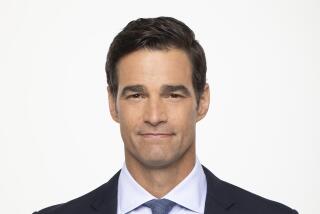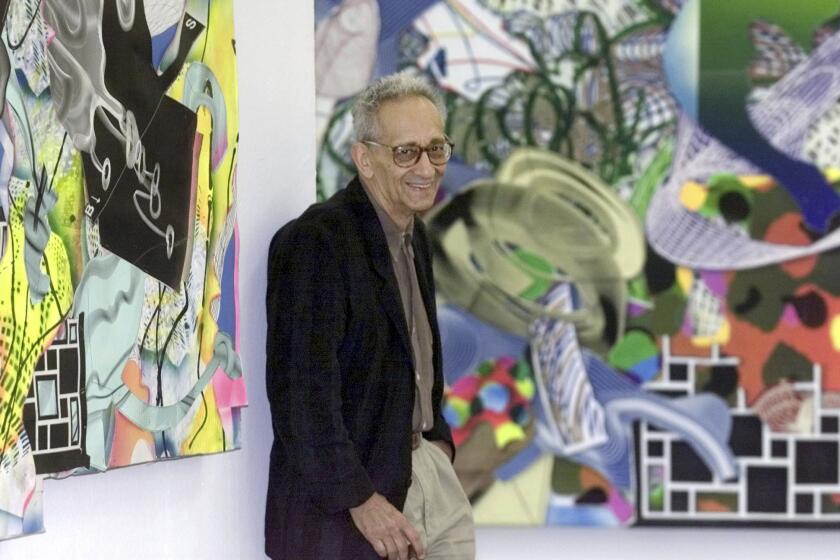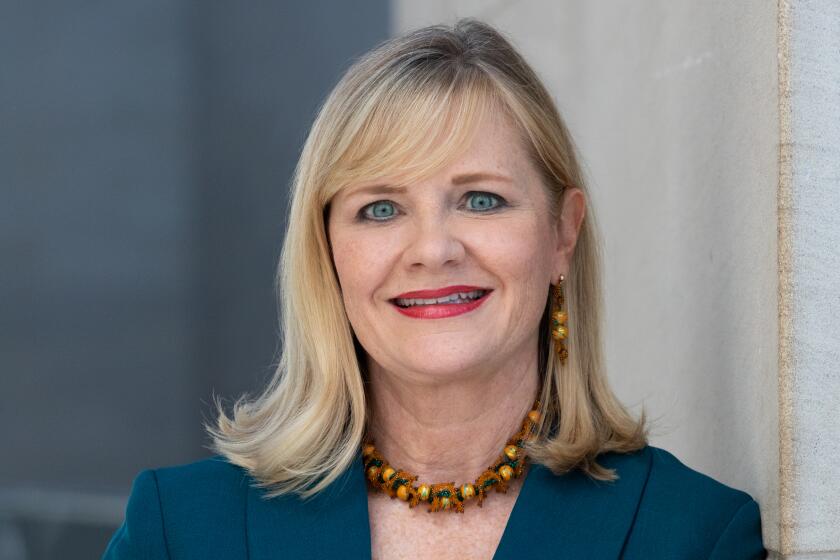In harmony as maestro and rabbi
Moshe Cotel thought he was leaving music behind when he forsook a successful career as a composer and high-ranking conservatory professor in order, in his mid-50s, to become a rabbi. Fate, however, turned out to be not entirely on board with the plan.
As he finished his studies, Cotel proposed, out of laziness, to perform a rabbinical thesis rather than write one. So he was permitted to give a piano recital in which he paired traditional rabbinical monologues with pieces of classical music. To his surprise, he soon found he had something of a hit on his hands.
Word about the piece, “Chronicles: A Jewish Life at the Classical Piano,” quickly spread among the country’s rabbis, cantors and Judaica scholars. Over the last five years, Cotel has performed it 64 times before Jewish congregations and interfaith groups across the United States -- quite a schedule for a man who has a full-time gig as rabbi of a Conservative congregation in Brooklyn, N.Y.
“It’s an embarrassment of riches,” said Cotel, 64. “The whole thing kind of grew. None of this was on my life plan. If you told me my life would move that way a couple of years before it happened, I’d have said you were crazy. But God works in strange ways.”
The success of “Chronicles” led to calls for a sequel featuring Cotel’s own compositions and original transcriptions for piano. Thus he devised “Chronicles II: More Lessons From a Jewish Life at the Classical Piano,” which he will premier Thursday evening at Valley Beth Shalom synagogue in Encino under the co-sponsorship of the Jewish Music Commission of Los Angeles and the Harold M. Schulweis Institute.
In 2003, Valley Beth Shalom was one of the first venues where Cotel performed the first “Chronicles.” Audience response, according to one listener, was ecstatic.
“He just blew everybody away,” said Richard Braun, co-founder of the commission and a lay cantor at the synagogue. “I was tremendously impressed with him as a pianist, and he is a charming raconteur. He really engages the audience and has really creative thoughts relating musical pieces to Jewish sources and Jewish rituals.”
Braun said Cotel brought to mind the late pianist and raconteur Victor Borge, “but this is on a different level. It’s serious but entertaining, not nonsense stuff.”
Cotel was raised Orthodox, but by age 13 had written his first symphony and embraced classical music as his religion. At 23, he won the prestigious American Academy Rome Prize for music composition and studied in Italy for two years. Eventually he was appointed to the faculty of the Peabody Conservatory of Music at Johns Hopkins University in his native Baltimore, and rose to chairman of the composition department.
His re-conversion to a more intensely Jewish life was serendipitous. In the mid-1990s his opera “Dreyfus,” based on the notorious incident of official anti-Semitism in pre-World War I France, was performed in Germany and Austria. Cotel was invited to conduct the performance in Austria and, to brush up on his German, began taking language instruction from an elderly German widow, to whom he explained his opera.
Sometime afterward, he was walking to synagogue one Saturday morning when a voice behind him greeted him in Hebrew.
Cotel turned and, to his surprise, there stood the elderly German woman.
“Where did you learn Hebrew?” he asked.
“I’m taking lessons now,” she replied.
“Why are you taking Hebrew?”
“I never told you when you took those German lessons from me that I was born Jewish, and in my old age, I’m coming back to it, and it was because of you.”
Cotel was stunned. “My life changed in that moment,” he said. “I knew I had to become a rabbi. It just flew down into my head. Without knowing it, I had changed this woman’s life in her final years. One of the basic teachings of [Jewish mysticism] is everyone is born into this world with a task, with a mission, and our challenge is to discover what that mission is, to hear it above all the static we have in our heads.”
Although Cotel at first believed he was making a clean break with his musical past, he soon discovered that being a maestro and being a rabbi are not all that different. Both words mean “teacher,” he said.
“In retrospect, it wasn’t a big jump at all. Both rabbis and teachers have people open their hearts to them. Both have ceremonies and rituals. I was kind of a high priest holding forth in the conservatory, and now I’m a different kind of high priest. Classical music was my religion. So, it was one religious calling following another.”
The “Chronicles” series amalgamates those callings. “Chronicles II” follows in the tracks of “Chronicles I.”
One of the new pieces is “The Beatles Meet Kabbalah,” the latter referring to a set of Jewish mystical beliefs. “I talk about what the rabbis had to say about love,” Cotel said. “I ask, ‘Love is all you need? Are you sure?’ and I talk about what the rabbis say, then perform my own transcription of the Beatles song.”
In another new piece, “Swimming in the Talmud With Murex Trunculus,” Cotel traces the long historical effort to rediscover the source of the deep, permanent blue dye prescribed for coloring the tassels of pious Jews’ prayer shawls in the Jewish bible.
Thought lost to history, the answer was discovered only recently: The dye came from a gland of a certain sea snail, known scientifically as murex trunculus. With that story, Cotel performs George Gershwin’s “Rhapsody in Blue.”
Cotel is scheduled to perform three more times in California this year after his Encino appearance. He’ll perform “Chronicles I” at Temple Judea in Tarzana on March 15, at Temple Mishkon Tephilo in Venice on March 16 and at Beth Shir Sholom Temple in Santa Monica on June 14.
“At this rate, I should pass 80 performances by the end of this season and 100 by the end of next year,” he said. “I literally can’t schedule any more. Whenever I have time off from my pulpit, I’m on a plane.”
Which at the very least gives him plenty of time to plan future works. The combination of old rabbinical monologues and the classical music repertoire, he said, “seems to be an inexhaustible fountain.”
More information about Thursday’s recital is available on the Jewish Music Commission’s website, www.jmcla.org, and Valley Beth Shalom’s website, www.vbs.org
--
More to Read
The biggest entertainment stories
Get our big stories about Hollywood, film, television, music, arts, culture and more right in your inbox as soon as they publish.
You may occasionally receive promotional content from the Los Angeles Times.






